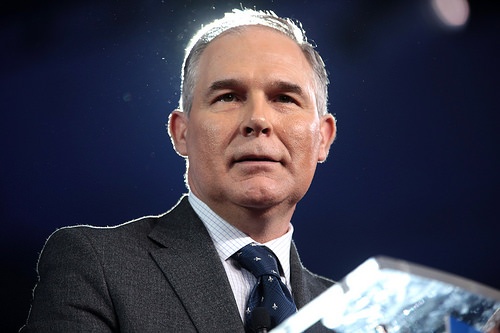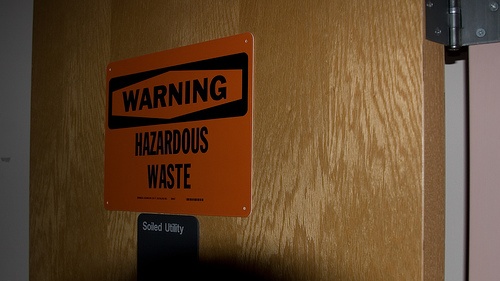On April 2, the US Environmental Protection Agency (EPA) announced that it has completed its “midterm evaluation” of greenhouse gas (GHG) emissions standards for cars and light trucks for model years 2022-2025, has decided to withdraw standards agreed to between the Obama Administration and California during 2016, and will conduct additional rulemaking to consider less stringent standards. This review began in March 2017, soon after President Trump appointed Scott Pruitt as EPA administrator with a mandate to reduce regulation. California, which has special authority under the federal Clean Air Act (CAA), is leading a coalition of states that has already sued to stop the change. In response to this push-back, President Trump has ordered federal agencies to negotiate with California to seek a compromise.
Read MoreAudit, Compliance and Risk Blog
EPA Decides to Revise 2022-2025 Automobile GHG Emission Standards
Posted by Jon Elliott on Tue, May 22, 2018
Tags: Environmental risks, Environmental, EPA, Greenhouse Gas, ghg
EPA Withdraws “Once in Always in” Policy For Major Air Toxics Sources
Posted by Jon Elliott on Tue, Mar 06, 2018
The Clean Air Act (CAA) directs the Environmental Protection Agency (EPA) to define “hazardous air pollutants (HAPs)” that may pose acute health hazards, and to impose regulations to reduce those hazards. Controls include permits for “major sources” of HAPs based on “Maximum Achievable Control Technologies (MACT),” and lesser controls for non-major “area sources.” Since 1995, EPA policy has been that every emission source that met major source criteria at the time a MACT became effective is “once in, always in” and cannot requalify as a less-regulated area source even if it accepts legally binding controls that reduce its “potential to emit.” On January 25, 2018 EPA reversed that decades-old policy.
Read MoreTags: Environmental risks, Environmental, EPA, Greenhouse Gas, ghg, climate change, CAA, mact
California Adopts Plan for Greenhouse Gas Controls Through 2030
Posted by Jon Elliott on Tue, Feb 27, 2018
Since enacting AB 32 in 2006, California has pursued aggressive policies to reduce statewide greenhouse gas (GHG) emissions. Primary responsibilities are assigned to the California Air Resources Board (ARB), although other state agencies implement complementary policies within their areas of special jurisdiction. In addition to emissions control regulations, state law assigns ARB to develop a Scoping Plan that identifies the state’s strategic goals, and compiles the many tactical approaches through individual regulatory and incentive programs. ARB issued the first Scoping Plan in 2008, with an update in 2014 and the latest update in 2017. The rest of this note describes changes in the latest Scoping Plan to reflect the state’s ever-expanding GHG reduction goals.
Read MoreTags: Health & Safety, California Legislation, Environmental risks, Environmental, Greenhouse Gas, ghg
Regional Greenhouse Gas Initiative Extends Efforts Until 2030
Posted by Jon Elliott on Tue, Feb 13, 2018
One of the longest running sub-national greenhouse gas (GHG) control efforts in the U.S. has been the Regional Greenhouse Gas Initiative (RGGI) program. RGGI provides a cap-and-trade program covering GHG emissions from targeted fossil fuel power plants in participating northeastern states. The program t has just been revised and extended through 2030.
Read MoreTags: Environmental risks, Environmental, Greenhouse Gas, ghg, cap-and-trade
Businesses Using “Science-Based Targets” to Reduce Greenhouse Gas Emissions
Posted by Jon Elliott on Thu, Oct 26, 2017
The Paris Agreement anticipated that sub-national governments and private organizations would contribute to global progress, by meeting and often exceeding national requirements (I wrote about formal United Nations programmatic expectations here).
One of the non-governmental efforts is the Science Based Targets Initiative, through which individual companies can set GHG-reduction goals. At latest report, over 300 companies participate.
What is the Science Based Targets Initiative?
The Initiative is a multi-sector collaboration among the following international organizations: CDP (formerly called the Carbon Disclosure Project), World Resources Institute (WRI), the World Wide Fund for Nature (WWF; formerly World Wildlife Fund), and the United Nations Global Compact (UNGC). Participation in the Initiative is also identified as one of the commitments under the We Mean Business Coalition, which is another international business initiative. The Initiative defines “science-based targets” by reference to the Initiative’s effort to support the 2o C target (which the Initiative refers to as the “2°C pathway”):
Read MoreTags: Health & Safety, Environmental risks, Environmental, EPA, Greenhouse Gas, ghg, climate change
International Business Group Recommends Climate-Related Financial Disclosures
Posted by Jon Elliott on Tue, Aug 15, 2017
As governments worldwide consider expanding requirements to manage greenhouse gas (GHG) emissions and moderate climate change, private sector groups are mobilizing to craft voluntary reporting and management activities – which might shape or even avoid future governmental mandates. In May, the 32 international business leaders on the Financial Stability Board’s (FSB’s) Task Force on Climate-related Financial Disclosure issued recommendations for climate-related financial disclosures by public companies worldwide. The Task Force reported these recommendations to the Group of 20 (G-20) leaders at last month’s meeting in Hamburg – the G-20 finance ministers and central bankers had asked FSB in 2015 to commission the Task Force.
Read MoreTags: SEC, Greenhouse Gas, ghg, climate change
California Extends and Amends its Greenhouse Gas Cap-and-Trade Program
Posted by Jon Elliott on Tue, Aug 08, 2017
Since 2012, California has administered a “cap-and-trade” program, setting total greenhouse gas (GHG) emission limits from selected major emitting sectors and creating tradeable emission permits and offsets to provide flexibility and encourage innovation. The program was created under authority of the state’s 2006 “AB 32” legislation, which focuses on reducing statewide GHG emissions by 2020. This authority would have expired in 2020, but new legislation extends the program until 2030. In order to secure enough votes for the extension, legislative leaders and Governor Brown agreed to statutory changes in this program and related air quality programs.
Read MoreTags: California Legislation, Environmental risks, Environmental, Greenhouse Gas, ghg, cap-and-trade
EPA Administrator Scott Pruitt has been on a tour to publicize his efforts to get EPA “back-to-basics.” He launched the tour with a visit to a Pennsylvania coal mine in April. The agency issued a press release about that visit, which also summarized its “Back-to-Basics Agenda.” The press release summarizes the Agenda as “Protecting the environment; engaging with state, local and tribal partners; and creating sensible regulations that enhance economic growth.” The Agenda provides a convenient rhetorical framework for the new Administrator’s efforts to re-boot EPA’s activities.
Read MoreTags: Environmental risks, Environmental, EPA, Greenhouse Gas, ghg, Hazcom, Oil & Gas, climate change, tsca, clean water
The U.S. Environmental Protection Agency (EPA) administers rules governing the import and export of hazardous waste regulated by the Resource Conservation and Recovery Act (RCRA). These rules ensure that the U.S. meets its international responsibilities as a member of the Organization for Economic Cooperation and Development (OECD) by creating national rules that meet agreed-upon OECD standards.
Read MoreTags: Environmental risks, Environmental, EPA, Greenhouse Gas, ghg, Hazcom
California Tightens Restrictions On High-Impact Short-Lived Climate Pollutants
Posted by Jon Elliott on Tue, Oct 11, 2016
Attempts to reduce greenhouse gas (GHG) emissions are more complex than they first appear. Reports in the mass media tend to focus on carbon dioxide (CO2). The United Nations Framework Convention on Climate Change (Framework Convention) focuses primarily on six GHGs, including CO2 as well as methane (CH4), nitrous oxide (N2O), hydrofluorocarbons, perfluorocarbons, and sulfur hexafluoride (SF6). Climate change scientists have identified hundreds of GHGs, with widely varying sources, relative contributions to climate change (numerical “global warming potential (GWP)”, where CO2 is defined as 1.0), and total contribution based on emitted volumes.
Read MoreTags: California Legislation, Greenhouse Gas, ghg, Hazcom, climate change










